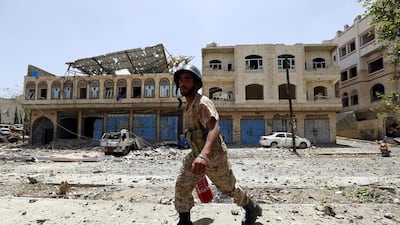Earlier today, Saudi Arabia shot down a ballistic missile that had been aimed at Riyadh by Houthi factions in Yemen. The group said their target had been Al Yamama Palace, the official residence of King Salman. This is the third missile to be fired from Yemen in a matter of weeks.
Saudi Arabia is fighting an asymmetric war with Iran in Yemen – one where its conventional military strengths are at a disadvantage in facing Iranian-backed insurgency. For all the comparisons between the two regional powers, Saudi Arabia and Iran have long been mismatched. Iran excels in fighting ambiguous wars both on the ground and rhetorically. Iran's strategy hinges on supporting militia groups in the region to push its wider Middle East agenda. It controls dozens of militias in Iraq, as well as Bashar al Assad's ground forces in Syria, including regiments of Shia militants. Hizbollah, Iran's long-arm in Lebanon, is Tehran's most powerful and successful venture in proxy building in the Arab world. The Iranians are aiming for the same in Yemen with their support of the Houthis.
Iran leverages its strengths in its campaign to dominate the Middle East. Those strengths lie in cultivating and supporting non-state militias quickly and efficiently. It has supported Sunni non-state actors as well, despite stark differences between their ideology and the Islamic Republic's. The point was to harm the United States in Afghanistan and Iraq. In Yemen, Iran supports a group of like-minded militants for the purpose of making asymmetric war against Saudi Arabia.
The Saudi military has its shortcomings, but there is a central point about the Saudi military often ignored. It is a conventional and primarily defensive force. Procurement, training and development plans for the Saudi military are geared towards enhancing its ability to defend the homeland.
While the Saudi internal security forces are among the world's most competent in dealing with insurgency and asymmetric conflicts (domestic counterterrorism forces wiped out Al Qaeda in the Arabian Peninsula), the military is trained and equipped for conventional operations. Unconventional conflicts prove difficult for many traditionally trained and equipped armies—as Vietnam did for France and then the United States. Post-invasion Iraq served Iran as a laboratory for the development of its skills in waging asymmetric war against the United States.
Large conventional armies are equipped and trained to locate military infrastructure and weapons stocks through satellites and conventional military intelligence means. They are designed to take out these installations, defend against attacks, and secure conventional military victory by conventional means. Iran would hesitate to provoke conventional war.
The Iranian's might have malicious motives, but they are rational actors. They know that they would be the biggest losers in any zero-sum confrontation and to that end, they have successfully taken conflict and negotiation to different fronts. They have chosen theatres outside Iran for their conflicts, principally Iraq, Syria, Lebanon and Yemen. While their forces devastate states throughout the Middle East, Tehran has never been more peaceful. In parallel, they negotiated a deal with the west specifically on the issue of nuclear non-proliferation and continued to wreak havoc throughout the region and demonstrate, every single day, why the idea of a nuclear Iran is such a dreaded one.
It is only rational for states to operate on terms that favour their core strengths. In a situation of all-out war between Iran and Saudi Arabia, everyone would lose. An Iranian missile fired at Riyadh sheds light on an important bottom line dynamic in the region: the Saudis have a far superior air force, defence system and navy than the Iranians. They have a better equipped military intelligence apparatus and far superior munitions. Iran must recalibrate its foreign policy. It has been wreaking havoc in the Middle East on its own terms and drawing on its own strengths. It must realise that such recklessness could cause its regional adversaries to draw on their competitive advantages. Deterrence is a function of clarity. It is the responsibility of regional and international stakeholders to make this dynamic crystal clear to the Iranians in order to avoid dangerous escalation. After the previous missile attack on Riyadh, the Saudis stated in clear terms that "The coalition considers Iran's support of the Houthis a direct aggression by Iran against the Kingdom that may be considered an act of war." In a May interview, Saudi Crown Prince Mohammed bin Salman said, "We will not wait until the battle occurs in Saudi Arabia, but we will work so that the battle is in Iran."
Mohammed Alyahya is a non-resident fellow at the Atlantic Council

